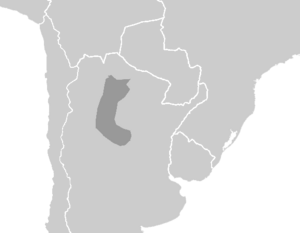Social:Lule–Vilela languages
From HandWiki
| Lule–Vilela | |
|---|---|
| Geographic distribution | northern Argentina |
| Linguistic classification | One of the world's primary language families |
| Subdivisions |
|
| Glottolog | None |
 | |
The two Lule–Vilela languages constitute a small, distantly related language family of northern Argentina. Kaufman found the relationship likely and with general agreement among the major classifiers of South American languages. Viegas Barros published additional evidence from 1996–2006. However, Zamponi (2008) considers Lule and Vilela each as language isolates, with similarities being due to contact.[1]
Internal classification
Internal classification of the Lule–Vilela languages by Mason (1950):[2]
- Lule–Vilela
- Lule
- Great Lule (of Miraflores, of Machoni)
- Small Lule
- Isistiné
- Tokistiné
- Oristiné
- Vilela
- Atalalá
- Chunupí (Sinipé, Chulupí)
- Yooc (Yoo, Wamalca)
- Ocolé
- Yecoanita
- Pasain (Pazaine)
- Omoampa (Umuapa)
- Vacaa
- Vilela
- Ipa
- Takete
- Yoconoampa (Yecunampa)
- Wamalca
- (Malbalá ?)
- Lule
Unclassfied languages are Tonocoté, Matará, and Guacará.[2]
Vocabulary
Loukotka (1968) lists the following basic vocabulary items for Lule, Vilela, and Chunupí.[3]
gloss Lule Vilela Chunupí one alapea two tamop three tamlip head tokó niskún niskan tooth l'ú lupé water to má maá fire ikue nié nié sun ini oló oló moon kopi kokpi star tókxo tree é maize pilis fish peás dog huan-okol jaguar ikém ikempé black kirimit
Proto-language
For reconstructions of Proto-Lule-Vilela by Viegas Barros (2006),[4] see the corresponding Spanish article.
References
- ↑ Zamponi, Raoul. 2008. Sulla fonologia e la rappresentazione ortografica del lule. Arte y vocabulario de la lengua Lule y Tonocoté, ed. by Antonio Maccioni, xxi–lviii. Cagliari: Centro di Studi Filogici Sardi.
- ↑ 2.0 2.1 Mason, John Alden (1950). "The languages of South America". Handbook of South American Indians. 6. Washington, D.C., Government Printing Office: Smithsonian Institution, Bureau of American Ethnology Bulletin 143. pp. 157–317.
- ↑ Loukotka, Čestmír (1968). Classification of South American Indian languages. Los Angeles: UCLA Latin American Center. pp. 63–65. https://archive.org/details/classificationof0007louk.
- ↑ Viegas Barros, J. Pedro (2006). Proto-Lule-Vilela: Una Reconstrucción Fonológica Preliminar. Comisión “Lenguas Chaqueñas” del 52 Congreso Internacional de Americanistas. Sevilla (España): Universidad de Sevilla. 17-21 de julio de 2006.
- Viegas Barros, J. P. (2001). "Evidencias del parentesco de las lenguas lule y vilela". Colección Folklore y Antropología, 4. Santa Fe: Subsecretaría de Cultura, Dirección Provincial de Gestión Cultural. pp. 15–21.
- Adelaar, William F.H.; Pieter C. Muysken (2004). The Languages of the Andes. Cambridge: Cambridge University Press. pp. 385–392. ISBN 0-521-36275-X. https://archive.org/details/languagesandesca00adel.
- Greenberg, Joseph; Ruhlen, Merritt (2007-09-04). An Amerind Etymological Dictionary (12 ed.). Stanford: Dept. of Anthropological Sciences Stanford University. http://www.merrittruhlen.com/files/AED5.pdf. Retrieved 2008-06-27.
External links
- Alain Fabre. 2005. Diccionario etnolingüístico y guía bibliográfica de los pueblos indígenas sudamericanos. 'Lule–Vilela'
 |
